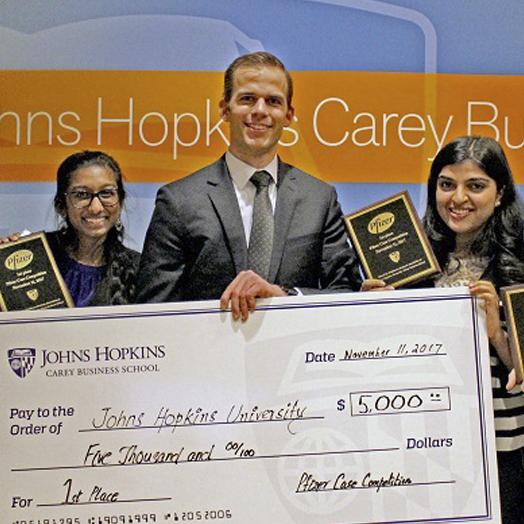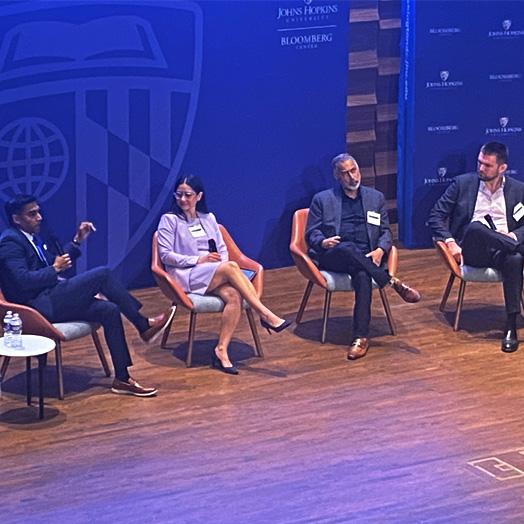Five students from the Carey Business School and Bloomberg School of Public Health beat out other universities for the $5,000 prize by employing a novel design thinking approach.

Johns Hopkins Students Win Pfizer Case Competition
Pfizer Executives Declare Johns Hopkins Solution Most Innovative, Viable
Five Johns Hopkins University students won first place and $5,000 at the 5th Annual Pfizer Case Competition held on Nov. 11 at the Johns Hopkins Carey Business School. The case competition, hosted by the Healthcare Business Association (HBA) at Johns Hopkins University, brought 10 student teams hailing from universities across the nation to Baltimore to compete on a case judged by panel of Pfizer executives.
The first-place Johns Hopkins team was comprised of three Global MBA students from Carey – Priya Arunachalam, Stephen DeMars, and Misha Isran – and two students from the Bloomberg School of Public Health – David Buxton, Master of Public Health candidate; and Dexter Waters, a Master of Science in Public Health candidate.
The University of Southern California took home second place and $3,000. The University of California Berkeley placed third winning $2,000. Other participating top schools included Harvard University, the University of Chicago, Northwestern University, Dartmouth College, Columbia University, Duke University, and New York University.
The case centered on creating a strategy for increasing compliance for a pneumonia vaccine in either children or seniors. The teams were tasked with leaning on behavioral economic theory to create and defend their unique strategy for the case. The Johns Hopkins team employed a design thinking approach that focused on creating a catch-all for pitfalls within possible solutions.
“We put ourselves in the shoes of the stakeholders to understand the barriers confronting each of them, allowing us to develop what we believe is a comprehensive, simple, and feasible intervention,” Arunachalam said.
The Johns Hopkins team attributes their win to the “innovation and feasibility” of their solution, as well as their presentation’s “funneled approach,” which started with the bigger picture before focusing on the heart of the idea.
“We were careful in how we defined the problem, and developed a comprehensive intervention inspired by solutions that have been used to address similar problems in different populations,” Waters said.
The team also credited their diverse makeup to their success.
“I think our diverse backgrounds and team spirit set us apart from other teams. Everyone on the team brought a unique perspective at each step of the problem,” Isran said.
Buxton added: “For me, this has been one of the best parts of my Johns Hopkins experience thus far. You can learn a lot from working collaboratively with students in the other programs and schools, and I feel that Johns Hopkins really does a great job at fostering these environments.”
The students said case competitions like Pfizer provide a unique opportunity to apply academic theory to actual issues. They also offer the students exposure to business executives at major companies, like Pfizer, who provide valuable insight through their professional experience.
“Case competitions provide a unique platform to apply classroom concepts for novel real world solutions,” DeMars said. “It’s a compelling way to leverage recently acquired skills, learn from peers, and engage with industry.”
